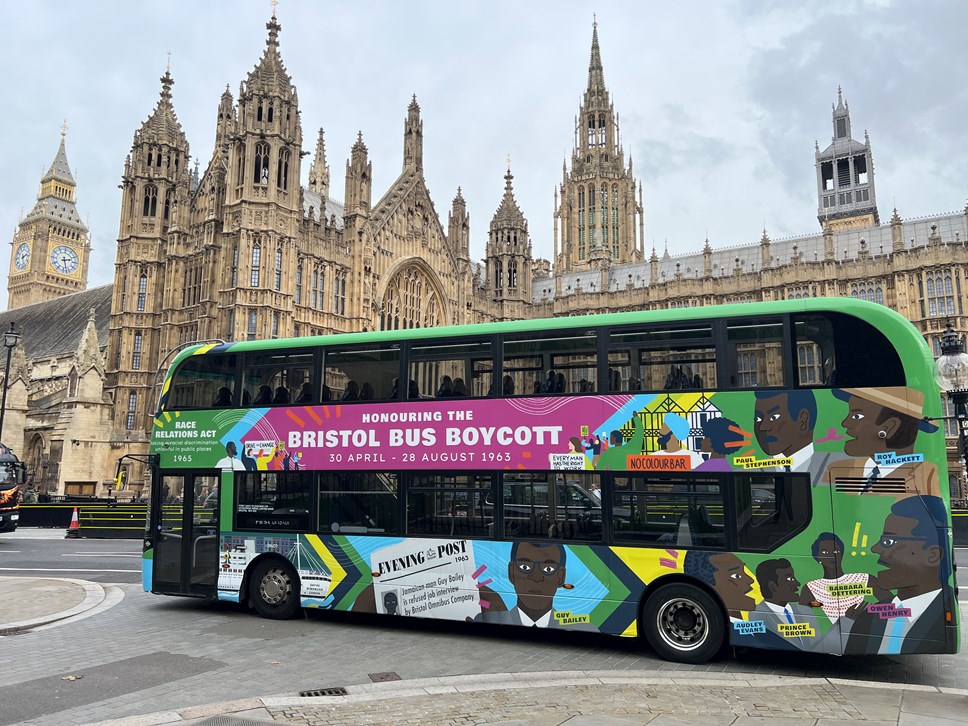
Swapping the streets of Bristol for the streets of London
A First West of England bus swapped the streets of Bristol for the streets of London today to say a special thank you to the pioneers of the Bristol Bus Boycott.
The bus operator’s specially designed bus arrived at the Palace of Westminster in the heart of the capital this afternoon for a parliamentary reception hosted by Bristol West MP Thangam Debbonaire to recognise 60 years since the iconic boycott.
Among the guests arriving on the boycott bus were Guy Bailey, who was refused a job as a driver because of the colour of his skin which sparked the boycott; Bristol’s High Sheriff Sharon Foster; Bristol’s last bus conductor Hazel Bailey; and a number of those who took part in the protest as well as their family and friends. A group of young activists - inspired by the boycott - also took the journey to Westminster.
Those attending today’s celebrations were invited to a cross-party reception hosted by Bristol West MP and Shadow Culture Secretary Thangam Debbonaire, which focused on equality and inclusivity to mark October’s Black History Month. At the reception, the boycott protesters and supporters were thanked for their work in tackling inequality, and heard a number of speeches from politicians and boycott pioneers, before being taken on a tour of the Palace of Westminster and finally meeting Labour Leader Sir Keir Starmer.
Doug Claringbold, Managing Director for First West of England, said: “Today is another landmark moment in this year’s commemorations of the 60th anniversary of the Bristol Bus Boycott. To be recognised and thanked right at the heart of Parliament will be a memory many of those who attended will cherish forever, and I’m so proud that our team at First West of England played its part in helping to make this moment happen.
“The boycott was a truly milestone moment in our history, and what the pioneers did 60 years ago, along with those who stood in solidarity, shows what ground-breaking change we can achieve if we work together.”
Today’s visit was part of a larger campaign, dubbed Drive for Change, to mark the boycott’s anniversary, and has been organised jointly by First West of England, Bristol Ideas, Creative Connex and Curiosity UnLtd.
The organiser of the Westminster visit, Julz Davis, Disruptor in Chief at Curiosity UnLtd, said: “When Rosa Parks sat down, Bristol stood up and marched. The day the Bristol Bus Boycott defeated the colour bar, Martin Luther King had a dream. This peaceful and purposeful protest inspired the Race Relations Act of 1965. This was the UK's first-ever piece of anti-racist legislation, and today, it sits at the heart of the Equalities Act 2010.
“So, in a year of many anniversaries, the 60th anniversary of the Bristol Bus Boycott stands heads and shoulders above the rest. It has been a privilege to co-ordinate bringing the pioneers of the boycott to Parliament to be thanked for their invaluable contribution to racial justice.”
Notes to editors
The Bristol Bus Boycott
The four-month boycott in 1963 was sparked after bus operators at the time introduced a new rule banning Black and Asian people from becoming drivers and conductors.
In the 1960s, Bristol’s bus services were operated by Bristol Joint Services, owned by the Corporation of Bristol and the privately owned Bristol Omnibus Company, whose workers belonged to the Transport and General Workers’ Union.
In 1955, the local branch of the union passed a resolution to ban Black or Asian people from working as bus conductors and drivers. This policy was exposed by the Bristol Evening Post in 1961 sparking the launch of a new campaign group.
Inspired by the events of the 1955 Montgomery bus boycott, in which Rosa Parks and other community activists refused to give up their seats, a boycott of Bristol’s entire bus network began on 30 April 1963, lasting for four months. It ended in August 1963 when the Bristol Omnibus Company was finally forced to end its ‘colour bar’. The campaign helped pave the way for the UK’s Race Relations Acts of 1965 and 1968.
